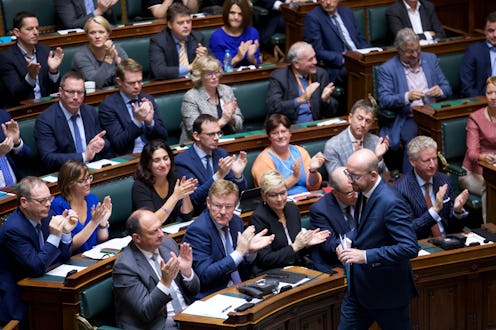News
Delegates & Electors Are Actually Really Different
At this point, most of us are feeling ready for the election on Nov. 8 to be over, so we can bask or weep at the results, and then bathe in lavender oil and take a day off the internet. In the meantime, however, it's crucial to learn the intricacies of our political system and answer questions such as, are delegates the same as electors? Despite common confusion, delegates are not the same as electors, and while the functions of both positions help determine the final outcome of the election cycle, their actual roles are actually quite different.
To make it clear, the role of delegates is to help pick the presidential nominees, while the purpose of the electoral college is to elect the actual president after the state votes are tallied. So while the power of both delegates and electors boost candidates either into party nomination, or into full-fledged presidency, they are involved in very different steps of the democratic process and bear different levels of significance.
In order to secure a nomination into the presidential race, candidates compete for delegate votes during the primaries and caucuses. The candidate who gains the support of the majority of delegates (within their registered party) wins the nomination and goes on to run for president.
There are currently 4,765 delegates allocated to the Democratic National Convention, and 2,472 delegates at the Republican National Convention, so the candidates had to secure the majority of delegates pledged to their respective parties in order to win their nomination.
During the primaries preceding the 2016 election, Hillary Clinton won 2,814 democratic delegates beating her opponent Bernie Sanders' 1,893 delegates and securing the nomination. On the other side of the competition, Donald Trump won 1,543 delegates over Ted Cruz' 543 delegate votes, which in turn handed him the Republican nomination. While the delegates hold significant power in their ability to pick the actual nominees, their individual symbolic power is much less than that of electors since there are thousands of delegates, and only 538 electors who have been selected and pledged to represent the majority vote of their state on election night.
In conclusion, the delegates are responsible for voting during the primaries and nominating the presidential candidates. The electors are pledged to the voting results of their state on election night, and ultimately vote the president into office. They are both important in very different ways, but now, it's the electors' turn.
